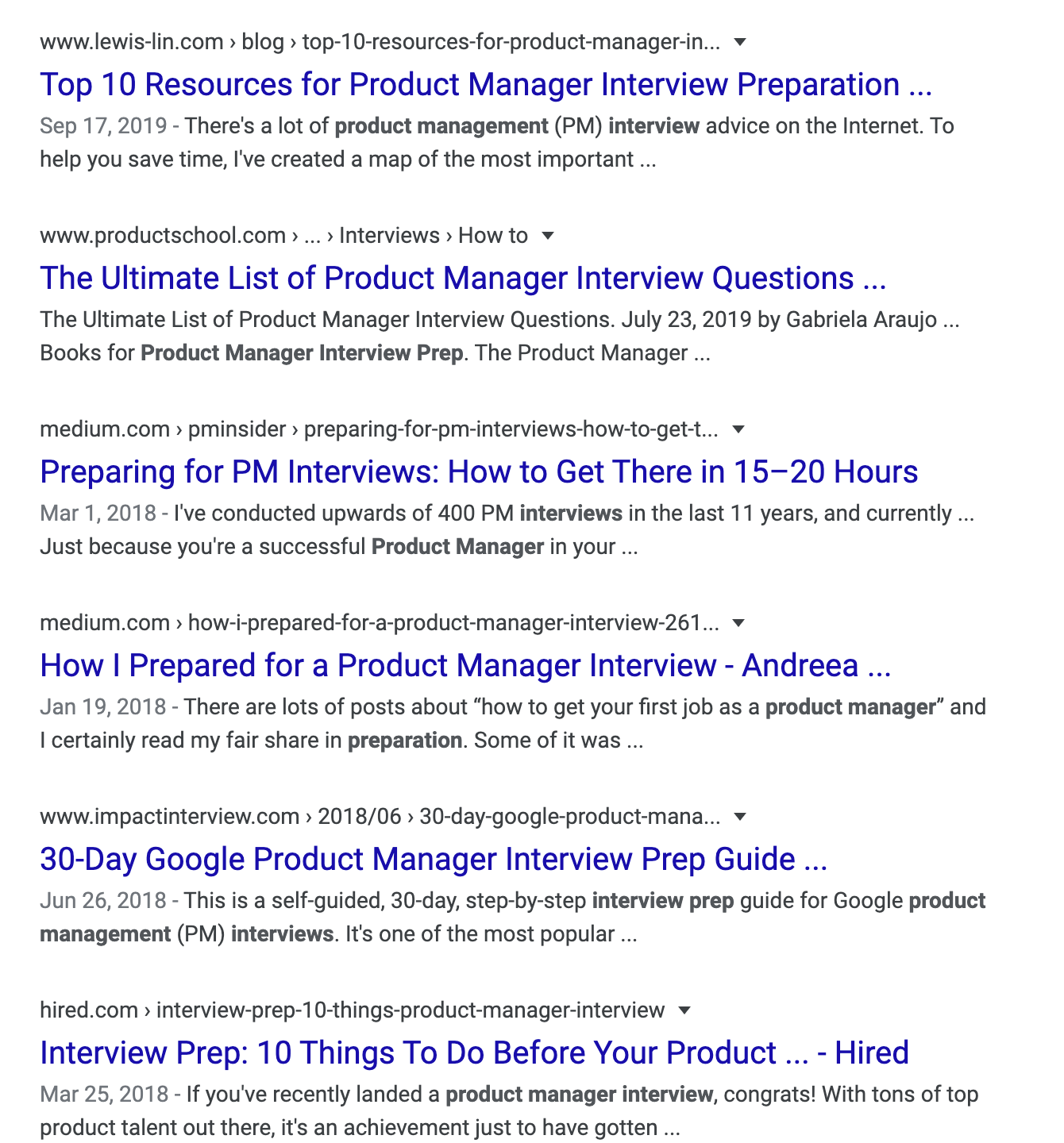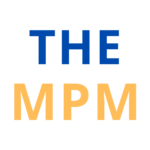You just got an interview for a Product Manager job…congratulations!
You’re on the verge of one of the most exciting and fast-growing careers today. Over the past decade, I’ve interviewed hundreds and hired dozens of Product Managers at Vistaprint Digital, Upside Travel, and ICX Media.
What do you do now? If you’re like most people, you’re going to Google the company you’re interviewing with and “product manager interview” or “product manager interview questions”.
You’re going to scour the typical questions they ask and the highly curated suggested answers. You’ll memorize as many of these answers as you can and mold yourself into the ideal product manager candidate.

Here’s why that might not be the best idea.
In researching for this post, I’ve looked at countless websites that come up on the first page of results for these and related search terms and I’ve found some recommendations I agree with and many, many, many that I don’t.
So let’s dive in, let’s separate the best way to prepare for your PM interview from the BS that’s out there, and let’s get you that job.
The Right Way to Prepare
Ahead of your interview, here are some of the major things you’ll definitely want to think about and do.
- What Have You Built?
This is a simple question that can get asked in so many different ways.
It might be surprising that I’m recommending you take time to think about this question because you may have never been a Product Manager before.
But, the best Product Managers I’ve ever hired were born builders. They’ve built businesses in school, they’ve built teams around a shared purpose, they’ve built automation into their lives to simplify tasks, they’ve simply built. It’s in their DNA.
Take time, think about what you’ve built, and construct a story on why you decided to build and what you built. You’ll be able to leverage this story for a wide variety of PM interview questions.
2. How Do You Think About Building and Prioritizing?
In addition to the “what” you built and “why” you built, “how” do you build?
What is the method that you evaluate what to do 1st, 2nd, 3rd?
Again, if you haven’t been a Product Manager before, that’s no problem. You can either leverage your build story from #1 or you can draw from your past professional or educational experience.
What I’m looking for here is that you have a logical approach to gathering feedback, mobilizing and communicating with stakeholders, building small, testing, iterating, releasing again, and collecting data.
None of these steps has to be perfect or follow an exact framework, rather, I simply want to see that when you build, you think, you observe, you react.
3. How Do You Communicate Similar Information to Different People or Different Groups?
A great Product Manager is a master communicator. In any given day, it’s likely they talk with developers, designers, marketing, leadership, other PMs, and customers (at least!). Those 6 different stakeholders each have preferred communication styles and care deeply about a particular subset of information.
How have you communicated the same core information to different people in different ways?
Think about your past roles or about your education. Have you communicated information to both technical and non-technical stakeholders? Craft this story and show how you also pay attention to these stakeholder’s reactions and questions to make sure they understand what you’re communicating. What other strategies do you leverage to make sure these stakeholders are engaged and informed?
4. Study the Product
It’s incredible how many PMs I’ve interviewed that haven’t used the product they’re interviewing to help build. Aside from being lazy, this also indicates a massive lack of passion for the product and the career. This is one of the biggest red flags I see and has no excuse.
Take the time to do a thorough evaluation of the product and the company that you’re interviewing at, considering the following (at a minimum)
- What problem(s) does this product solve?
- Who uses this product?
- What are the strengths of this product?
- What are the weaknesses of this product?
- What differentiates this product from competitors? Who are those competitors?
- What questions would I ask the current PM about this product?
- How does this product fit into the overall business? (Is it a lead product, is it supporting, is it legacy?) → You can likely figure this out pretty easily on the external marketing website
5. Know What Type of Product Manager You Are (And Also, What You’re Not!)
At your PM interview, it’s important that you are confident about the type of PM you are (or want to be) and the PM you are not. I’ve written about the 5 different types of PMs here:The 5 Different Types of Product ManagersWhich type of Product Manager are you (or do you want to be)? Author: Alex Mitchellblog.usejournal.com
Note: Being a particular type of Product Manager is no excuse to avoid developing some competency in the other areas. Rather, it’s an important act in self-awareness that positions you better to know when you should work on something or ask an expert on the team for help.
The Wrong Way to Prepare
Here are (just a few) of the PM interview preparation recommendations I’ve seen and definitely don’t agree with.
- Memorizing Definitions of Agile, Scrum Ceremonies, and Frameworks
While you should certainly understand these concepts at a high level (ex. sprints, retrospectives, Agile manifesto), reciting these definitions verbatim in an interview will show me the exact opposite of what I’m looking for: flexibility in solving problems.
Definitions are inherently not flexible and Product Management is a career that simply can’t be memorized from a book.
2. Memorizing Case Studies/Assuming What Worked Then Works Now
Similar to memorizing definitions, memorizing case studies won’t get you very far in a Product Management interview or a Product career. The role of the Product Manager changes so rapidly that what worked then likely won’t work now.
A significantly better approach would be to highlight past Product decisions the company you’re interviewing at made that you agree/disagree with and explaining why.
Create a case study of your own: talk about the problem, how you would have approached it, how you would have measured data, and the decision you would have made.
As an interviewer, this approach would be significantly more interesting to me than you talking about a case study from a different company that may or may not be related.
3. Studying Countless Logic and Math Problems
Depending on where you’re interviewing, you may get a number of logic questions and math problems during the interview process. Don’t waste time trying to memorize the most common ones they may ask.
Rather, understand what the interviewers are looking for here: a rational approach to problem-solving that gets within an order of magnitude of something reasonable.
Begin your response by asking clarifying questions to your interview to make sure you fully understand the problem. Next, start talking out your thought process.
Candidates I’ve interviewed that talk out their problem-solving usually do the best and I also get to see inside their brain. When you arrive at an answer, talk about how you would further validate or increase your confidence in that answer, what other data would be helpful, definitely don’t just present a number.
4. Pretending or Attempting to Be a Technical Expert or a Developer
The bar of technical understanding required for Product Managers continues to rise. But, you’ll do yourself no favors in pretending or attempting to be a technical expert or a developer (unless you are a Technical Product Manager!)
Rather, it’s important that you understand enough about the technology to be able to understand the trade-offs your developers will face, potential maintenance concerns, and the dangers of accumulating tech debt.
Additionally, questions about your technical understanding are a great opportunity to share how you’re always trying to learn about new technologies (through Coursera/Udemy/Khan Academy courses).
P.S. If you aren’t learning something new, get started now with CSS, JS, HTML, Python, or ML!
5. Preparing “Standard” Product Manager Questions and Failing to Interview the Interviewer
Your goal for all of your Product Manager interviews is to create an environment that resembles more of a conversation between co-workers than a one-sided question asking session.
If you aren’t able to achieve this balance, it’s highly likely you won’t get the role.
The best way you can get to this balanced conversation is by ignoring the “standard” PM interview questions suggested on Google. Instead, be a highly active participant in the conversation. Show genuine interest throughout and don’t be afraid to ask a healthy number of questions intermittently over the course of the interview.
If you wait until the end to ask your questions, it’s almost always too late.
How to Stand Out
- Highlight What You’ve Done Outside of Your Day-to-Day Career or School
As I’ve mentioned before, successful (and even unsuccessful) side hustles say a lot about you as a PM candidate. Here’s a post that goes into much more depth about why side hustles are a great way to stand out:
2. Demonstrate Interest by Developing and Testing Hypotheses in the Interview
After doing your detailed research on the company and its products, take it a step further and create a hypothesis for how the company fits into the competitive landscape and pitch the hypothesis during the interview.
It’s completely ok to ask the interviewer if your hypothesis is right or wrong.
This approach both demonstrates a large amount of interest and offers many follow up opportunities. After sharing this hypothesis, you can ask about the product roadmap, further explore the competitive landscape, and even ask what the most important goals are for the business in the next 3–6–9–12 months.
You’re now interviewing the interviewer, congratulations.
Go Get That Job!
Thank you for reading, now go get to work: focus on the things that will help you stand out as a PM candidate, avoid those that everyone else is doing, and above all else, be engaged and enthusiastic: you’re on the verge of the most exciting career out there!
What’s the Best and Worst Advice You’ve Seen for PM Interview Candidates?
Share with me in the comments here or on Twitter at @amitch5903

